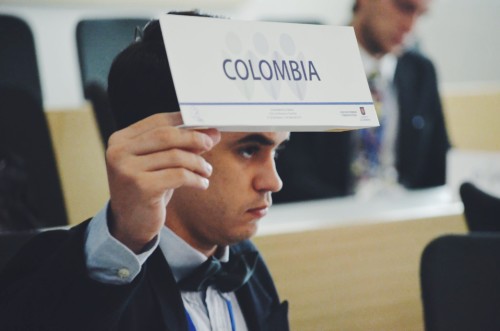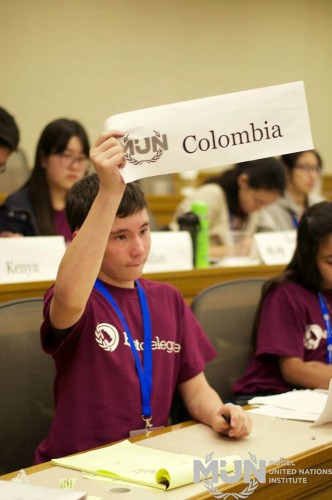Planning on traveling to a conference abroad? Still have doubts on the procedure? Don’t worry! We have designed a whole series on procedures around the world.
For our fourth article, we have decided to start with the procedure of a country in Latin America, which has been recently growing in the Model UN circuit: Colombia!
- How does the committee begin?
Usually, committee sessions begin with the typical role call (in alphabetical order). You will be the able to vote:
- Present (you are able abstain during resolution voting process)
- Present and voting (you are not able to abstain during the resolution voting process).
Remember every time the session is going to be open, the chair will proceed with the role call. This means you will be able to change your vote.The chair then will call for a motion to open the session.
In order to formulate a motion, you’ll need to raise your placard. Once the chair has called you, you’ll be able to present the motion to the committee.
Remember you are always required to stand up and talk in third person when presenting a motion or an intervention. Chairs in Colombia are usually stricter with these than in North American chairs.
- Opening speech
Once the session is opened, the chair will call for a motion to read the opening speeches.
Wait, but aren’t these read once the debate has begun? Not in Colombia.
The opening speech is a formal, pre-written speech, usually of no longer than 1 page.
Opening speeches are read in alphabetical order and the delegate who is reading the speech in most conferences will be required to stand up at the front.
The time you’ll be provided for reading your opening speech depends in the conference, however, most of the time it varies between 1 and 2 minutes.
In some conferences, you’ll be required to give a copy of your opening speech to the chair. Thus, if you are attending a conference in Colombia, it is always a good idea to take one or two copies with you.
2.1 Formal aspects
- The opening speech should always be written in third person.
- Remember to include at the top of the opening speech your delegation, the committee you are in, and the topics that will be treated in the committee. This should always be included in your opening speech. However, these aren’t read during the intervention.
- Opening speeches usually start with “honorable members of the chair, delegates, observers….”
- Your opening speech is your first formal intervention in the committee. You will be expected to include your country’s involvement with the topic, your position, and possible solutions to the topics that will be discussed during the committee.
- Opening the agenda, un-moderated caucus and speakers’ list.
Once open the session, the chair will call for then for a motion to open the agenda with the topic on _______. Usually, there is no debate on which topic will be discussed first. Most of the times, the topic the agenda is open with is the first topic addressed in the background guide.
Once the agenda is open, the chair will be open to either a moderated caucus (debate moderated by placards) or a speakers’ list.
If you are presenting the motion, remember you’ll be required establish the sub-topic to be discussed, set up the time for the debate as a whole (time for the debate usually varies between 20 minutes and an hour depending on the conference) and the time per intervention (no longer than a minute and a half).
For example:
“Motion to establish an unmoderated caucus for the following 45 minutes regarding the sub-topic on gender quotas in Latin America, with a time of 1 minute 10 seconds per speaker.”
In the case of being a speakers’ list, you’ll be required to set up the number of speakers and if you consider it necessary, you can divide the list between in favor and against.
For example:
“Motion to establish a 20 delegate speakers’ list for the following 30 minutes regarding the sub-topic on gender quotas in Latin America, 10 delegates in favor of gender quotas, 10 delegates against, with a time of 1 minute 30 seconds per speaker.
If you are not sure on how many time it will take to discuss the sub-topic, remember you can always set the time at the chair discretion.
Remember that, during this time, you are allowed to stand up, enter or exit the room unless you ask the chair for permission.
You can ask this by presenting a:
- Point of information to the chair: You’ll be allowed to approach to the chair and tell them your petitions and/or doubts (yes, you are allowed to ask questions about the committee and the topics being discussed)
- Point of information: Works similarly to the point of information to the chair, however, this is completely public.
Points of information are not allowed to interrupt other delegates. These should always be presented when the chair calls for points or motions.
Lobby time and resolutions.
Once the committee starts moving towards solutions, motions for lobby time will start to appear.
There are no formal rules during lobby time; however, you won’t be allowed to leave the committee in groups.
During this time, you’ll be able to start drafting your resolution and building your bloc.
Resolutions should always include:
- A formal heading: Draft resolution number, committee, topic, heads of block (two delegates) writers (all delegations which directly participated in the drafting of the resolution) and signatories (all countries present in the committee)
- In most conferences, a minimum of 5 pre-ambulatory clauses and 7 operative clauses.
Be careful with the last point, if your draft resolution has less than the minimum required of either one of both, your draft resolution will be automatically tabled down. This means that, if your bloc hands out a resolution with the minimum and one of your pre-ambulatory or operative clauses is tabled down as a result of unfriendly amendment, your whole draft resolution will be tabled down.
Once all resolutions had arrived to the chair, heads of bloc will have to pass to the front and read their respective resolution.
At the end of the lecture, the chair will ask the heads of bloc if they are open to points of information. If so, the heads of bloc will establish how many points of information they will be open to.
- Amendments and voting process
Amendments can be pass to the chair during the draft resolutions lecture. At the end of the points of information to the heads of bloc, the chair will proceed to read the amendments. These are divided into two:
- Friendly amendments: All writers are in favor of the amendment
- Unfriendly amendments: Not all writers are in favor of the amendment. The amendment is then submitted to the voting process.
Once one draft resolution has been read, and amendments are done, the chair will ask for a motion to submit the resolution to the voting process in alphabetical order. Delegations are able to vote:
In favor of the resolution
- Against the resolution
- In favor/against with reasons (When the vote is against the delegation’s policy)
- Abstains (If and only if the delegate voted present during the role call)
- Pass (If the delegate has not decided on its vote, the delegate may pass. The chair will then call the delegate again by the end of the voting process).
In most conferences, resolutions pass with two-thirds of the votes in favor. Also, most of them allow the committee to pass more than one resolution.
Once the first resolution is voted, the chair will call for a motion to read the next draft resolution (depending the committee draft resolution “2.2, 3.2…Etc.”)
After all, resolutions have been read and voted, the chair will ask for a motion to close the agenda. Only the end of the conference the session will be closed.
5.Points, motions and other formal aspects.
5.1 Motions
Other important motions to take into account are:
- Motion to take off the jackets: In Colombia, delegates aren’t allowed to take off their jackets unless there is first a motion. This motion passes by simple majority.
- Motion to suspend the session: This will be asked by the chair every time before lunch, break…Etc.
5.2 Points
- Point of order: It is used every time a delegate considers there was a mistake in the procedure. In most conference it can interrupt another delegate’s intervention.
- Point of relevance: It is used when the delegate considers another delegate’s intervention is out of the topic or sub-topic initially established. In most conferences, it can interrupt another delegate’s intervention.
- Point of personal privilege: It is to inform any unconformity or impediment that doesn’t allow the delegate to develop comfortably in the committee. For example, when he/she can’t listen properly to another delegate. It can interrupt another delegate’s intervention.
- Point of inquiry: It is used when a delegate has an inquiry on the committee procedure or a word. For example, a delegate can establish a point of inquiry when he or she wants to say a word that he/she only know in his/her native language.
5.3 Other formal aspects:
Almost all conferences have warnings for not following the procedure.
Moreover, most conferences have punishments after a determined number of warnings. For example, after 3 sanctions the delegate must stay out of the committee for 30 minutes.
Also, in almost all MUN conferences you’ll be able to use the right to reply when your delegation feels offended by another delegate. However, the formal procedure on the right of reply does vary a lot from one conference to another.
Finally, remember that Colombian conferences tend to be highly strict with the procedure. So if you are traveling to Colombia, remember always to keep up with the procedure.
**
Have any other doubts on the Colombian procedure? Wondering which conferences to attend in Colombia? Would you like your country to be the next in our series on procedures around the word?
Feel free to comment bellow!




